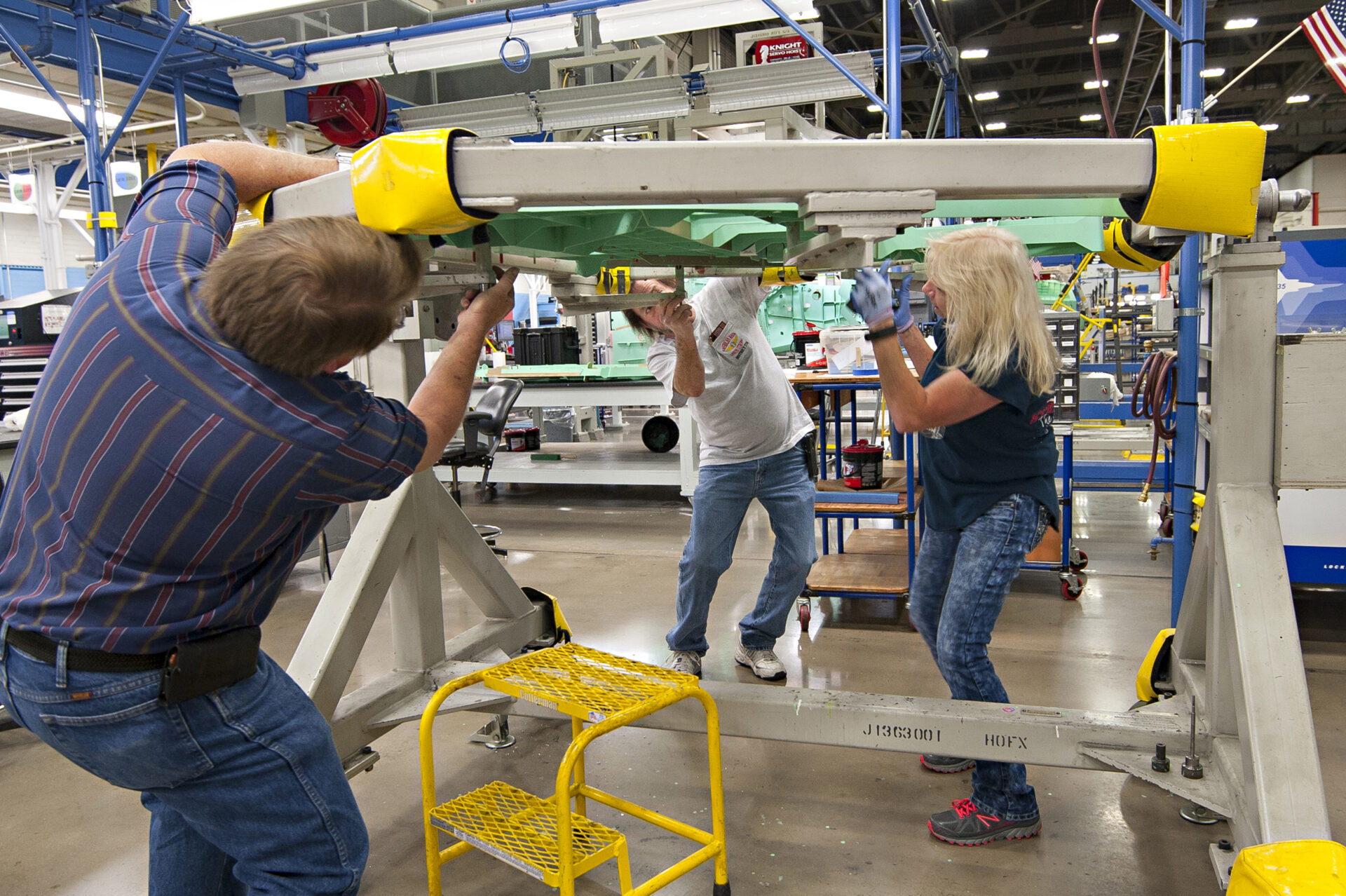When it comes to the United States’ goliath defense budget and pipe dreams of ever redirecting those resources toward other pressing needs, such as climate change, only the most dissenting members of Congress vote against the military-industrial complex because of a seemingly reasonable assumption: Their constituents rely on jobs in that complex and wouldn’t have it any other way.
The problem with that assumption is that defense workers, gagged by security clearances and strong-armed by their corporate employers, hardly get a chance to publicize their own diverse views. Remarkably, given those barriers to access, twin studies were published recently in “Environmental Politics” and the British Academy by researchers who were able to hear workers in their own words. The joint US-UK academic team held wide-ranging conversations with dozens of defense industry employees in the two countries about sustainability, decarbonization, and a “just transition” of employment away from the weapons industry and into the green economy.
The authors don’t claim their study is representative of the hundreds of thousands of people employed in the sector — try walking into your nearest Raytheon plant or military base to conduct a random survey and see how far you get before security intervenes. The team behind the study instead recruited participants through the creative use of social media, company newsletters, and cold emails. One researcher, who before her days as a college professor was a unionized electrician employed on defense projects toward the end of the Cold War, adeptly navigated labor spaces to cast a wide net looking for interviewees.
Even if such a nonrandom survey has obvious drawbacks, there’s still insight to draw from the variety of views the team encountered, which were at times radical, cynical, banal, conventional, open-minded, and curious.
Biofuels Or Fewer Tanks?
“The defense industry, from my point of view, is essentially a magic money tree. There is always money available no matter what you do,” one British employee at a defense manufacturer told them. “I didn’t wanna work in something that supported making machines of war,” a union leader at a US defense contractor told them. She added: “I would be happy to lose this job and find another. And if it was in a renewable resource, research, or job, that would be fantastic.”
At Lockheed, for example, at least 69% of workers were unionized in 1971. Just 19% were in 2022. At Northrop Grumman, only 4% of workers are unionized today, according to those companies’ annual reports.
As major military contractors promote their sustainability initiatives, from building weapons plants that are LEED-certified or adding solar panels to their parking lots, some workers on the inside roll their eyes at what they see as greenwashing. “There’s a lot of irony in the fact that I ride an electric bike to work to go and make jet engines,” one American worker told the researchers. “I would like to reduce the whole defense sector to decarbonize it,” a military veteran employed in the UK’s defense industry said, derisively adding: “The thought of biofuels being used for tanks is so insane I can’t believe anyone suggested it, less food and more fuel for tanks.”
Is it cognitive dissonance, or is it par for the course for workers to diverge from the company line in an industry that’s battered them by outsourcing, subcontracting, automation, and union-busting? Such dissenting views may be becoming more common as the military-industrial complex, from a labor perspective, just isn’t what it used to be. An estimated 3.2 million people were employed in the private defense industry in 1985, compared to just 1.1 million in 2019, according to the National Defense Industrial Association. The defense industry’s days as a hub for union strength have also faded. At Lockheed, for example, at least 69% of workers were unionized in 1971. Just 19% were in 2022. At Northrop Grumman, only 4% of workers are unionized today, according to those companies’ annual reports.
“Our Only National Industrial Plan”
Unions with defense workers in both countries have dabbled in just transition movements, but for labor leaders, two duties come into conflict — that of bettering conditions for working people and the parochial one of holding on to the employment their members have right now in an industry hemorrhaging jobs.
“We were a big industrial union, and our only national industrial plan is to make weapons, so the union took the position, well let’s make more of them,” a British worker told the academic team. An American union leader put it dryly: “I don’t make a lot of judgments on abortion, I don’t make a lot of judgments on gun control, I don’t make a lot of judgments on anything other than, what can you do to keep the people I represent in work? That’s my job, and to be anything other than that, it would really be a disservice to the people that are paying my salary.”
To be sure, many of the interviewees held conventional views. One fretted about wasting paper when long documents were printed unnecessarily at work. Another regretted that their workplace had only cardboard recycling and not glass, plastic, or tin, let alone composting.
So why highlight those dissenting workers now? The study’s authors have hopeful notes about how growing awareness of the need to decarbonize the economy is reaching even into the weapons sector. “The interviews with the defense workers for this study indicate that, even if currently a minority view, there are already seeds of this new counter-hegemonic force,” they wrote.
The report argues that advocates of a “swords into plowshares” just transition shouldn’t bypass or antagonize defense workers but fully include them, taking advantage of the “intelligent, articulate, moral and caring” qualities evident among the interviewed. If a handful of academics relying on backdoor methods to speak to hard-to-access workers garnered a variety of unorthodox views, it may be that those views aren’t such a rarity in the first place.
“One thing that I am really optimistic about,” an American worker told them, “is just how angry workers are right now.” He added: “And how much more power they seem to have than they ever had before. My hope is just that they keep that, because that’s what’s going to decarbonize and transition the defense sector, is the people that are doing the work.”




















